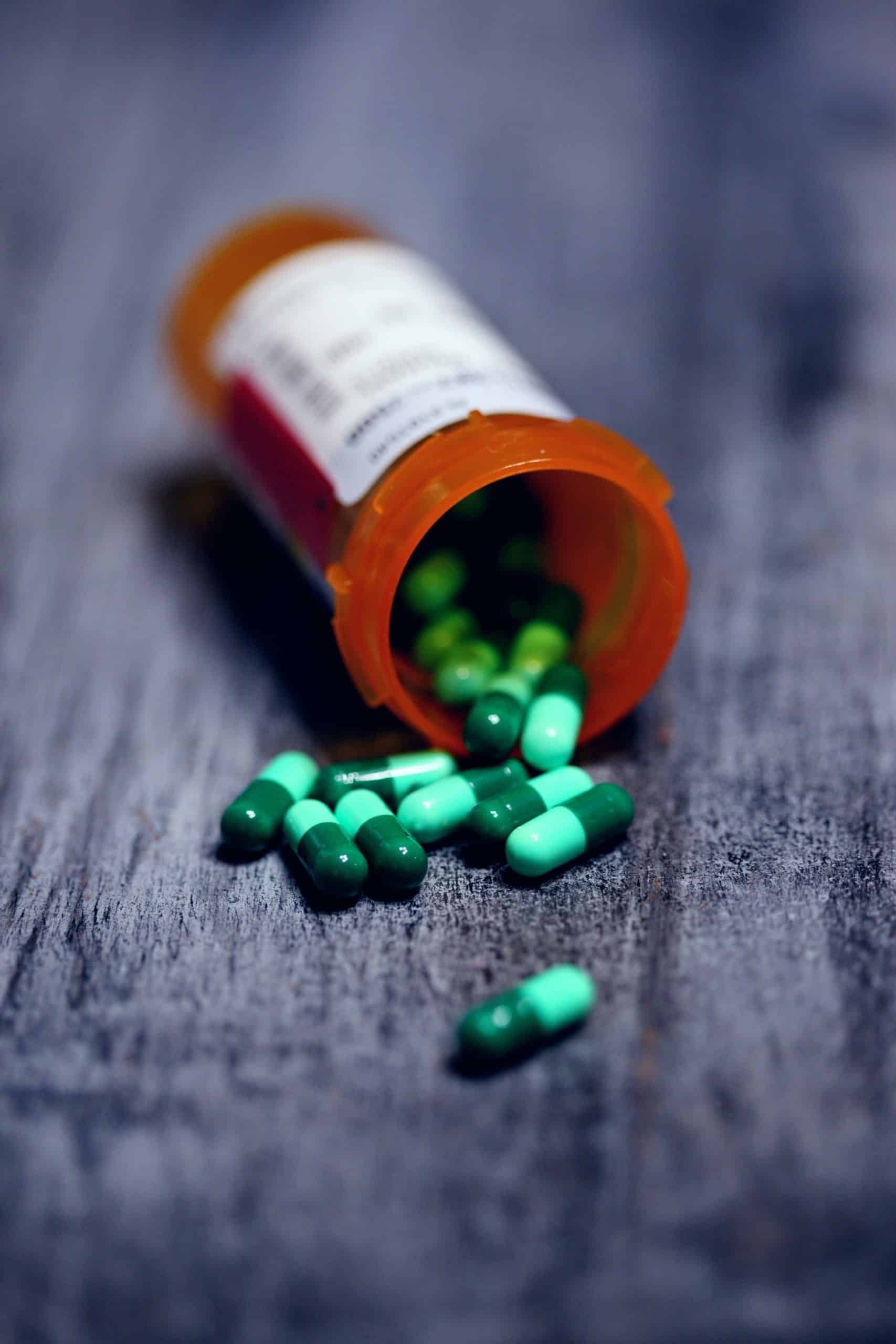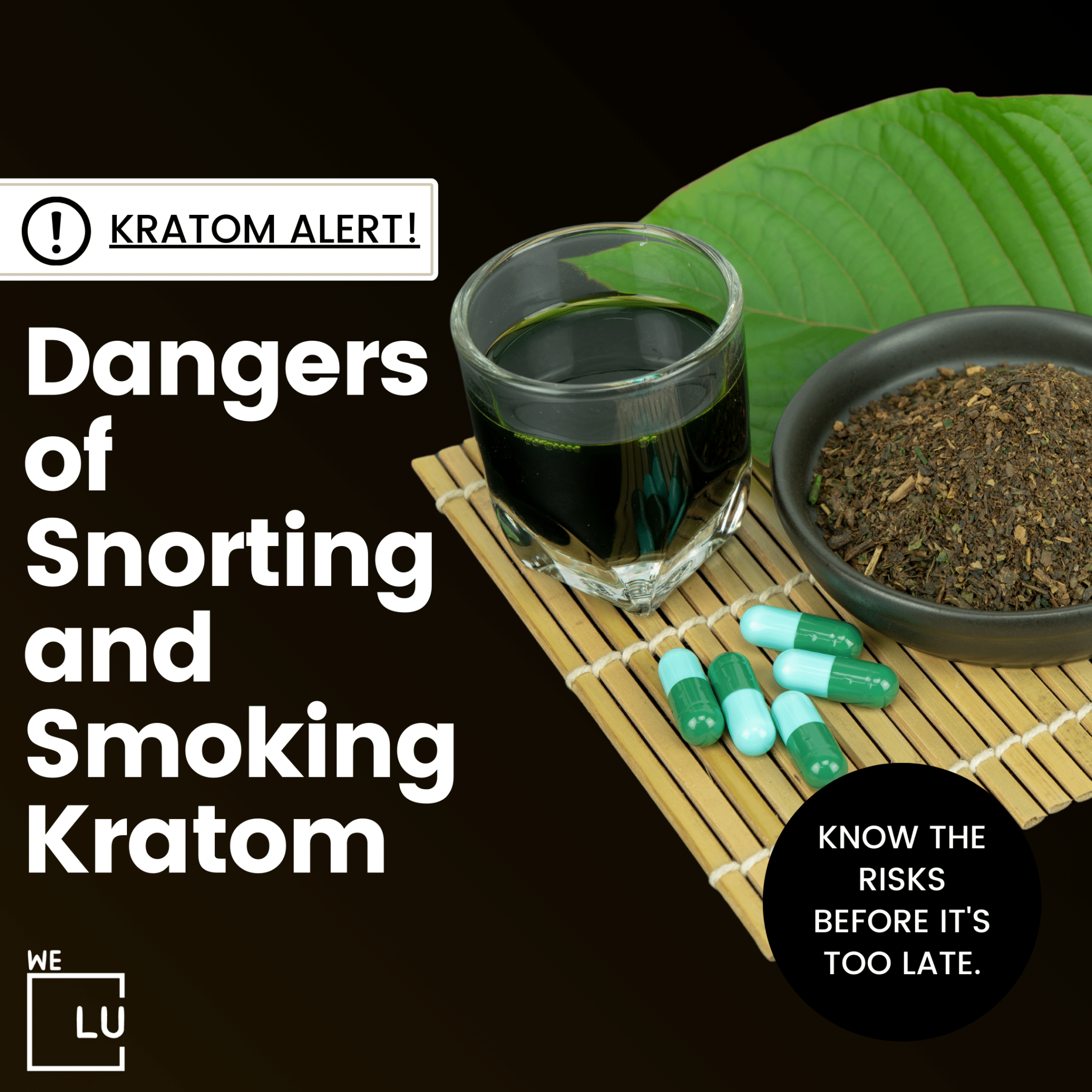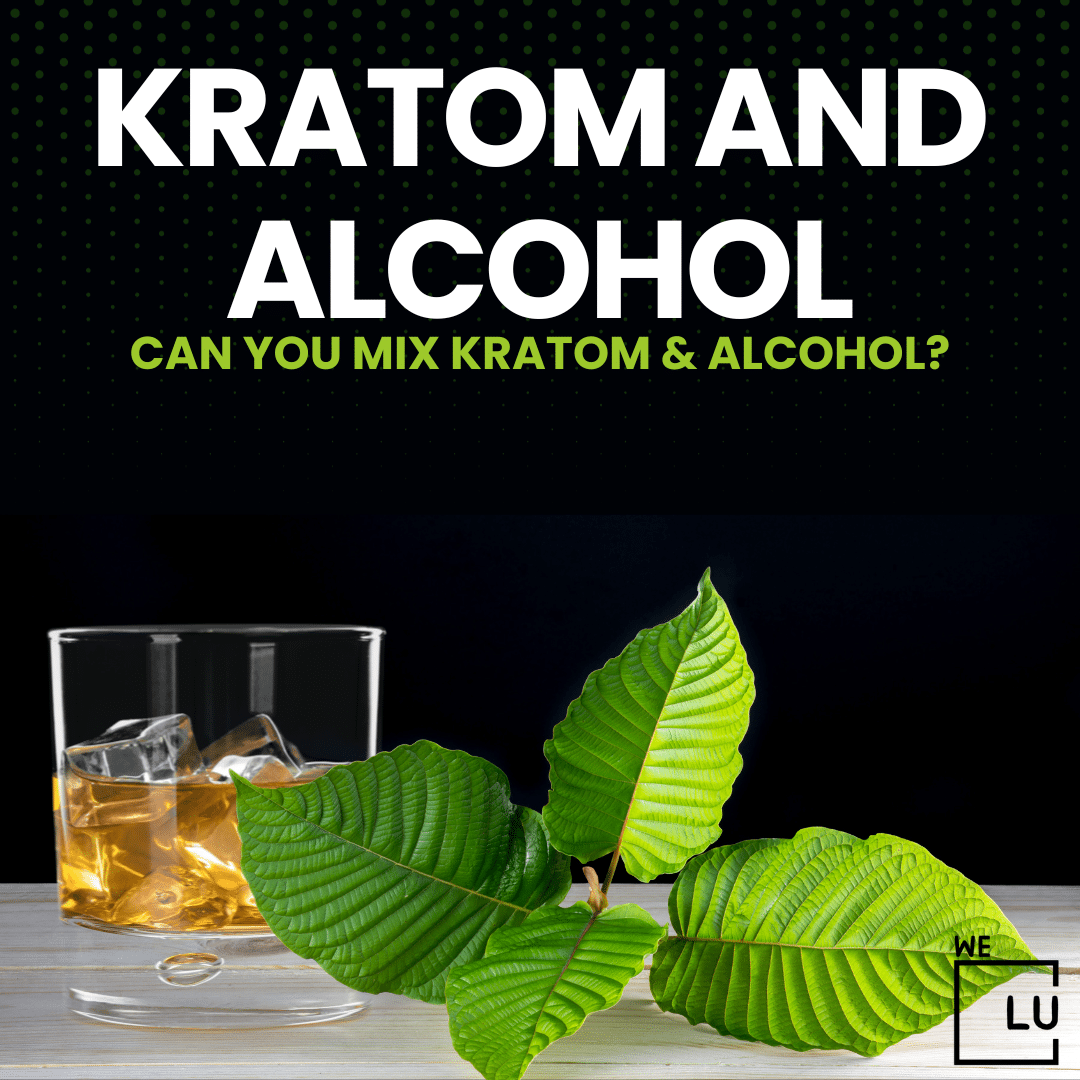Vyvanse, a medication for ADHD, may cause side effects like insomnia, decreased appetite, and increased heart rate. Misuse, such as taking higher doses, crushing, or combining with other substances, can intensify these effects, leading to serious health risks. Continue reading to learn more about what the Vyvanse side effects are.
If you or someone you know is struggling with Vyvanse misuse or addiction, contact We Level Up CA for support and guidance. Call us now for your free and confidential call!
What Is Vyvanse?
Vyvanse is a prescription medication that contains lisdexamfetamine, a central nervous system stimulant. It is primarily used in the treatment of attention deficit hyperactivity disorder (ADHD) and binge eating disorder.
Lisdexamfetamine is unique in that it is a prodrug, meaning it is inactive until metabolized in the body, where it is converted into dextroamphetamine. This conversion process provides a smoother and longer-lasting release of the active drug, reducing the potential for abuse. Vyvanse works by increasing the levels of certain neurotransmitters, such as dopamine and norepinephrine, in the brain, which helps improve attention, focus, and impulse control in individuals with ADHD.
Take Vyvanse as a healthcare professional prescribes and be aware of potential side effects, including insomnia, loss of appetite, and increased heart rate. Regular medical supervision is crucial to monitor the medication’s effectiveness and manage adverse reactions.
What Is Vyvanse Used For?
Vyvanse is primarily used for the treatment of attention deficit hyperactivity disorder (ADHD) and binge eating disorder. It contains the active ingredient lisdexamfetamine, a central nervous system stimulant.
- Attention Deficit Hyperactivity Disorder (ADHD): Vyvanse is prescribed to manage symptoms of ADHD in both children and adults. ADHD is a neurodevelopmental disorder characterized by persistent patterns of inattention, hyperactivity, and impulsivity. Vyvanse helps improve attention, focus, and impulse control by increasing neurotransmitters such as dopamine and norepinephrine in the brain.
- Binge Eating Disorder (BED): Vyvanse is also approved for the treatment of moderate to severe binge eating disorders in adults. Binge eating disorder involves recurring episodes of consuming large quantities of food in a short period, accompanied by a lack of control over eating behavior. Vyvanse may help reduce the frequency of binge-eating episodes.
Common Vyvanse Side Effects
Vyvanse, like any medication, may cause side effects. Not everyone will experience these side effects, and their severity can vary from person to person. Common side effects of Vyvanse may include:
- Insomnia: Difficulty falling or staying asleep can occur, especially if Vyvanse is taken later in the day.
- Decreased Appetite: Some individuals may experience a reduced desire to eat while taking Vyvanse, which can lead to weight loss.
- Dry Mouth: A sensation of dryness in the mouth may occur.
- Nervousness or Anxiety: Vyvanse is a stimulant, and some people may feel more jittery or anxious.
- Increased Heart Rate: Stimulant medications can lead to an elevated heart rate (tachycardia) in some individuals.
- Irritability or Agitation: Some people may become more irritable or agitated while taking Vyvanse.
- Nausea or Abdominal Pain: Digestive issues such as nausea or stomach discomfort can occur.
- Dizziness: Some individuals may experience dizziness, particularly upon standing up quickly.
- Sweating: An increase in sweating may be observed.
- Weight Loss: Some people may experience weight loss due to decreased appetite.
Inform your healthcare provider if you experience any side effects, especially if they are persistent or severe. Additionally, serious side effects such as chest pain, shortness of breath, or signs of circulation problems in fingers or toes should be reported immediately.
This list is not exhaustive, and individual reactions can vary. Always follow your healthcare provider’s instructions, and they can guide managing side effects or adjusting your treatment plan if necessary.
Vyvanse Side Effects In Females
Some potential Vyvanse side effects in females may include:
- Menstrual Cycle Changes: Stimulant medications like Vyvanse can sometimes affect the menstrual cycle. Women may experience changes in the regularity or intensity of their periods.
- Decreased Libido: Some individuals may experience a reduction in sexual desire while taking Vyvanse.
- Weight Loss: As a result of decreased appetite, women may experience weight loss. It’s essential to monitor weight changes, especially if there are concerns about maintaining a healthy weight.
- Insomnia: Difficulty sleeping or disrupted sleep patterns can occur, especially if Vyvanse is taken later in the day.
- Emotional Changes: Some individuals may experience mood swings, irritability, or increased anxiety.
- Dry Mouth: A common side effect of Vyvanse is dry mouth, which may be more noticeable in some women.
- Nausea or Abdominal Discomfort: Digestive issues such as nausea or stomach discomfort can occur.
Vyvanse Side Effects In Males
Here are some potential Vyvanse side effects in males:
- Erectile Dysfunction or Changes in Sexual Function: Some males may experience changes in sexual function, including difficulties with achieving or maintaining an erection.
- Decreased Libido: Vyvanse may lead to a reduction in sexual desire in some individuals.
- Insomnia: Difficulty sleeping or disrupted sleep patterns can occur, especially if Vyvanse is taken later in the day.
- Weight Loss: Some males may experience weight loss due to decreased appetite. Monitoring weight changes is essential, particularly if maintaining a healthy weight is a concern.
- Increased Heart Rate: Vyvanse is a stimulant, and some individuals may experience an elevated heart rate (tachycardia).
- Irritability or Anxiety: Stimulant medications can sometimes lead to increased irritability or anxiety.
- Dry Mouth: A common side effect of Vyvanse is dry mouth, which may be more noticeable in some individuals.
- Nausea or Abdominal Discomfort: Digestive issues such as nausea or stomach discomfort can occur.
The Long Term Side Effects Of Vyvanse
Vyvanse, like other medications, may have potential long-term side effects. Additionally, the long-term effects of Vyvanse are not fully understood, as the available research typically covers shorter durations. Here are some considerations regarding potential long-term side effects:
- Cardiovascular Effects: Stimulant medications like Vyvanse can affect heart rate and blood pressure. Long-term use may have implications for cardiovascular health, and individuals with pre-existing heart conditions should be closely monitored.
- Growth Suppression in Children: There is some concern that long-term use of stimulant medications, including Vyvanse, may be associated with a temporary slowing of growth in children. Regular monitoring of height and weight is recommended during extended use.
- Psychiatric Effects: Long-term use of Vyvanse may have psychological effects, including the potential for dependence or tolerance. Regular psychiatric monitoring is essential, especially in individuals with a history of substance abuse or mental health disorders.
- Sleep Disturbances: Insomnia is a common side effect of Vyvanse, and long-term use may contribute to persistent sleep disturbances. Monitoring and managing sleep patterns are essential for overall well-being.
- Gastrointestinal Issues: Vyvanse can cause digestive issues such as nausea, stomach pain, and loss of appetite. Long-term use may lead to persistent gastrointestinal symptoms.
- Psychosocial Effects: Prolonged use of Vyvanse may impact psychosocial factors, including mood and social functioning. Regular evaluation by a healthcare provider is crucial to address any changes in mental health.
Individuals taking Vyvanse long-term to have regular check-ups with their healthcare provider. The benefits of the medication, such as improved attention and focus, should be weighed against potential risks and side effects. Healthcare providers may adjust the dosage or explore alternative treatments based on an individual’s response.
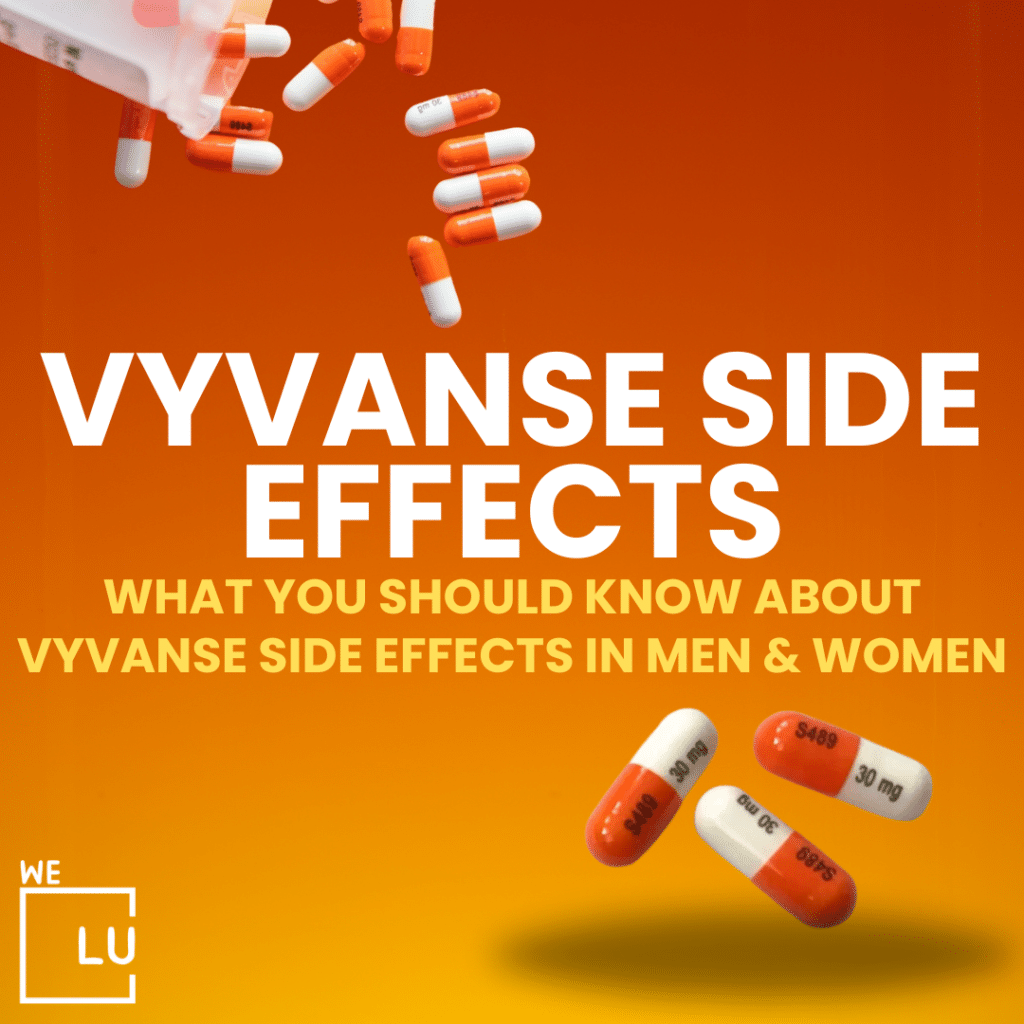
Skip To:
Learn More:
- Vyvanse Detox, Specifics, Withdrawal Symptoms, Timeline, Medications, Dangers & Treatment
- How long do amphetamines stay in your system? Peak Levels, Half-Life, Factors of Influence, Amphetamine Addiction, Withdrawal & Treatment
- Amphetamine withdrawal, Abuse, Symptoms, Medical Detox & Treatment for Addiction
- Amphetamine addiction, Types, Abuse, Signs, Dangers, Side Effects & Treatment Options
- Amphetamine psychosis, Symptoms, Withdrawal Psychosis, Signs of Addiction & Treatment
- Amphetamine effects, Types, Addiction, Effects on the Brain, Harmful Effects & Treatment Options
- Amphetamine vs Methamphetamine, Main Differences, Stimulants Specifics, Deadly Potential & Treatment Options

Get Your Life Back
Find Hope & Recovery. Get Safe Comfortable Detox, Addiction Rehab & Dual Diagnosis High-Quality Care.
Hotline (855) 695-1160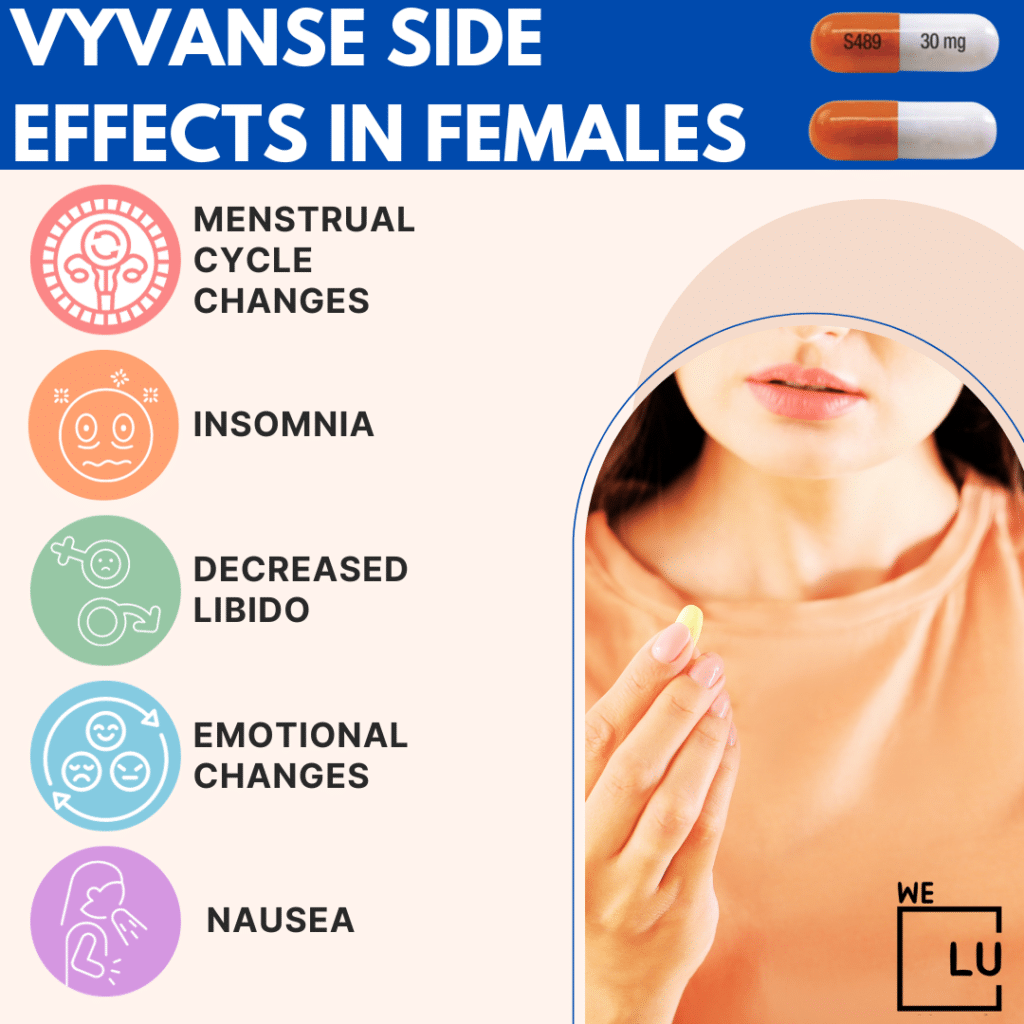
Vyvanse Effects On Personality
Vyvanse, like other stimulant medications used to treat attention deficit hyperactivity disorder (ADHD), primarily affects neurotransmitters in the brain, such as dopamine and norepinephrine. While Vyvanse is generally well-tolerated and can have positive effects on attention, focus, and impulse control in individuals with ADHD, its impact on personality can vary among individuals. Here are some considerations:
- Positive Effects:
- Improved Focus and Attention: One of the primary therapeutic effects of Vyvanse is the improvement of attention and focus, which can positively influence a person’s ability to engage in tasks and activities.
- Reduced Impulsivity: Vyvanse can help decrease impulsive behaviors, allowing individuals to think before acting.
- Potential Negative Effects:
- Emotional Blunting: In some cases, stimulant medications like Vyvanse may be associated with a sense of emotional blunting, where individuals feel a reduction in emotional intensity or expressiveness.
- Insomnia or Changes in Sleep Patterns: Difficulty sleeping is a common side effect, and lack of adequate sleep can impact mood and personality.
- Individual Variability:
- Personal Response: Individual responses to Vyvanse can vary widely. Some people may report feeling more focused and in control, while others may experience emotional changes or other side effects.
- Pre-existing Personality Traits: Vyvanse is not expected to change one’s personality fundamentally. However, it may enhance or diminish certain traits, and individual personality characteristics can influence how a person responds to the medication.
- Potential for Misuse:
- Misuse or Abuse: In some cases, stimulant medications like Vyvanse can be misused or abused. This can lead to alterations in behavior and personality and potential adverse health consequences.
Get Help. Get Better. Get Your Life Back.
Searching for an Accredited Drug and Alcohol Rehab Centers in Near You?
Even if you have failed previously and relapsed, or are in the middle of a difficult crisis, we stand ready to support you. Our trusted behavioral health specialists will not give up on you. When you feel ready or just want someone to speak to about therapy alternatives to change your life call us. Even if we cannot assist you, we will lead you to wherever you can get support. There is no obligation. Call our hotline today.
FREE Addiction Hotline – Call 24/7Long Term Effects Of Vyvanse On The Brain
The long-term effects of Vyvanse on the brain are a topic of ongoing research, and available data might not fully capture the potential consequences of extended use. Vyvanse is a prescription medication containing lisdexamfetamine, a prodrug that gets converted to dextroamphetamine in the body. Dextroamphetamine is a central nervous system stimulant that affects neurotransmitters in the brain, particularly dopamine and norepinephrine.
- Neuroplasticity: Chronic use of stimulant medications, including Vyvanse, may influence neuroplasticity—the brain’s ability to adapt and reorganize over time. This is an area of ongoing research.
- Dopamine Regulation: Vyvanse primarily affects the release of dopamine in the brain. Long-term use may influence the regulation of dopamine, potentially impacting reward pathways and motivation.
- Tolerance and Dependence: Some individuals may develop tolerance to the effects of Vyvanse over time, requiring higher doses to achieve the same therapeutic benefits. Additionally, long-term use may lead to physical dependence in some cases.
- Cognitive Effects: While stimulant medications can improve cognitive function in the short term, the long-term mental effects of Vyvanse are not fully understood. Some studies suggest potential cognitive enhancement, while others raise concerns about cognitive side effects.
- Effects on Mood and Mental Health: Chronic use of stimulant medications may impact mood and mental health. Individuals with a history of mental health disorders should be closely monitored for changes in symptoms.
- Cardiovascular Effects: Long-term use of stimulant medications may have implications for cardiovascular health. Regular monitoring of blood pressure and heart rate is recommended.
Individuals taking Vyvanse on a long-term basis to have regular check-ups with their healthcare provider. The benefits of the medication, such as improved attention and focus, should be weighed against potential risks and side effects. Healthcare providers may adjust the dosage or explore alternative treatments based on an individual’s response.
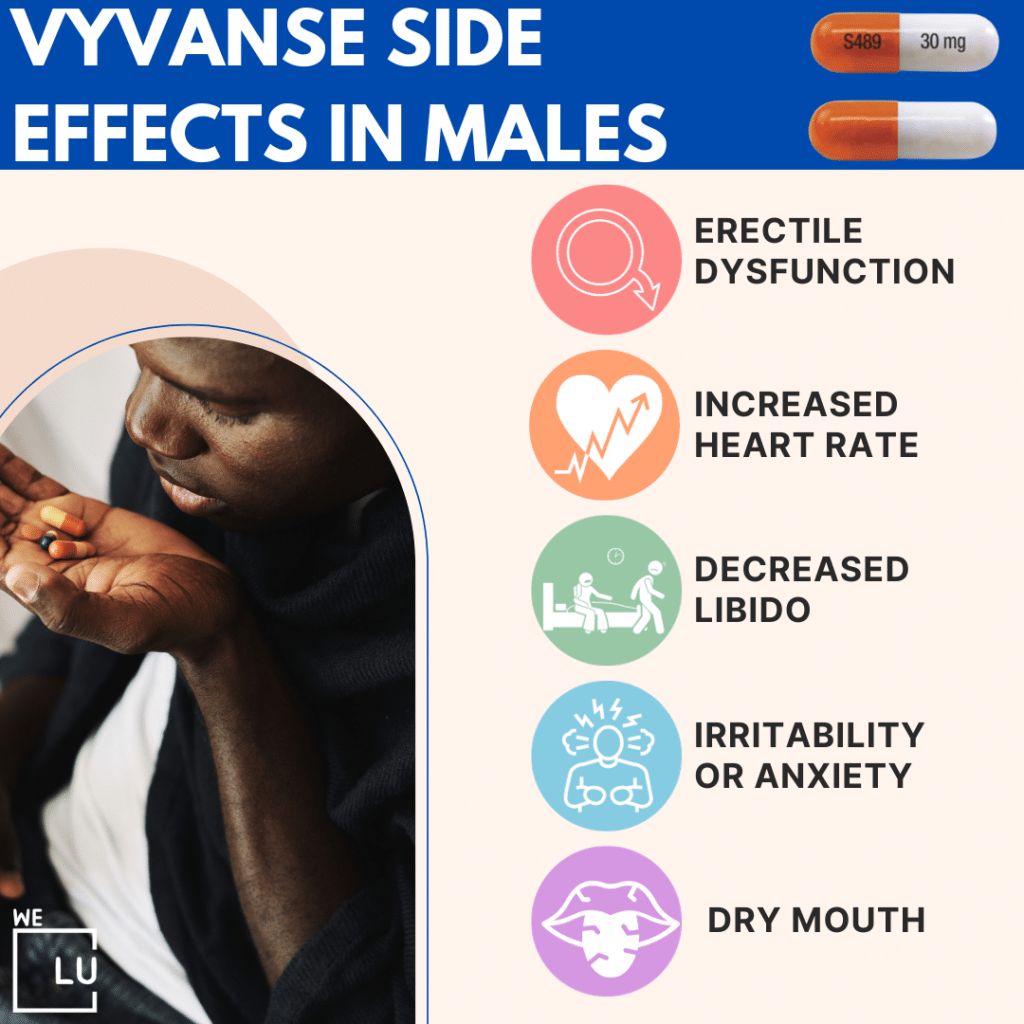
Comfortable Facilities & Amenities
High-Quality Addiction & Mental Health Rehabilitation Treatment
Rehab Centers TourRenowned California Addiction Center. Serene Private Facilities. Inpatient rehab programs vary.
Addiction Helpline (855) 695-1160Proven recovery success experience, backed by a Team w/ History of:
15+
Years of Unified Experience
100s
5-Star Reviews Across Our Centers
10K
Recovery Success Stories Across Our Network
- Low Patient to Therapist Ratio
- Onsite Medical Detox Center
- Comprehensive Dual-Diagnosis Treatment
- Complimentary Family & Alumni Programs
- Coaching, Recovery & Personal Development Events

Precautions For Vyvanse
- Medical History Discussion: Inform your healthcare provider about your complete medical history, including any pre-existing conditions, especially:
- Cardiovascular issues (e.g., heart problems, high blood pressure).
- Mental health conditions (e.g., anxiety, depression, bipolar disorder).
- History of drug or alcohol abuse.
- Any existing kidney or liver problems.
- Allergies: Disclose any known allergies or sensitivities to medications.
- Medication Interactions: Inform your healthcare provider about all medications (prescription, over-the-counter, or herbal supplements) you currently take, as Vyvanse may interact with certain drugs.
- Pregnancy and Breastfeeding: If you are pregnant, planning to become pregnant, or breastfeeding, discuss the risks and benefits with your healthcare provider. Vyvanse’s safety during pregnancy and breastfeeding is not fully established.
- Cardiovascular Monitoring: Vyvanse can affect heart rate and blood pressure. Individuals with pre-existing cardiovascular conditions should have their cardiovascular health monitored regularly.
- Mental Health Monitoring: Individuals with a history of mental health conditions should be closely monitored for changes in mood, behavior, or worsening of psychiatric symptoms.
- Potential for Abuse: Vyvanse is a Schedule II controlled substance due to its potential for abuse and dependence. It should be used only as prescribed by a healthcare professional.
- Growth Monitoring in Children: Children taking Vyvanse should monitor their height and weight regularly, as stimulant medications may be associated with temporary slowing of growth.
- Driving and Operating Machinery: Vyvanse can cause dizziness or blurred vision. Exercise caution when driving or operating machinery until you know how the medication affects you.
- Avoid Alcohol and Caffeine: Alcohol and caffeine can interact with Vyvanse, potentially increasing the risk of side effects. It’s advisable to limit or avoid the consumption of alcohol and caffeine.
Always take Vyvanse precisely as prescribed by your healthcare provider. Do not adjust the dosage or stop taking the medication without consulting your healthcare professional. If you experience any side effects or have concerns about Vyvanse, promptly discuss them with your healthcare provider. Regular follow-up appointments are essential to assess the medication’s effectiveness and monitor for potential issues.
World-class, Accredited, 5-Star Reviewed, Effective Addiction & Mental Health Programs. Complete Behavioral Health Inpatient Rehab, Detox plus Co-occuring Disorders Therapy.
CALL (855) 695-1160End the Addiction Pain. End the Emotional Rollercoaster. Get Your Life Back. Start Drug, Alcohol & Dual Diagnosis Mental Health Treatment Now. Get Free No-obligation Guidance by Substance Abuse Specialists Who Understand Addiction & Mental Health Recovery & Know How to Help.
Vyvanse Misuse
Misuse of Vyvanse involves taking the medication in a way or for a purpose other than prescribed by a healthcare professional. Vyvanse is a prescription medication containing lisdexamfetamine, a central nervous system stimulant primarily used in the treatment of attention deficit hyperactivity disorder (ADHD) and binge eating disorder. Here are some potential ways in which Vyvanse may be misused:
- Taking Without Prescription: Using Vyvanse without a valid prescription from a healthcare professional is considered misuse. This can include obtaining the medication from someone else or using leftover medication from a previous prescription.
- Taking Higher Doses: Some individuals may misuse Vyvanse by taking higher doses than prescribed in an attempt to enhance its stimulant effects. This can increase the risk of adverse effects and complications.
- Crushing or Snorting: Crushing Vyvanse tablets to snort the powder is a form of misuse. This method is sometimes used to bypass the extended-release mechanism of the medication and achieve a more immediate and intense effect.
- Injection: Some individuals may misuse Vyvanse by dissolving the medication and injecting it. This method poses serious health risks and has a higher potential for harm.
- Combining with Other Substances: Misuse may involve combining Vyvanse with other substances, such as alcohol or other drugs. This can increase the risk of adverse interactions and side effects.
Misuse of Vyvanse can have serious consequences, including:
- Cardiovascular Issues: Stimulant medications like Vyvanse can increase heart rate and blood pressure. Misuse may exacerbate cardiovascular problems or lead to new issues.
- Psychological Effects: Misuse can contribute to anxiety, agitation, and other psychological symptoms. Individuals with a history of mental health conditions may be particularly vulnerable.
- Dependency and Addiction: Long-term misuse of stimulant medications can lead to dependence and addiction, making it challenging to stop using the drug.
Experience Transformative Recovery at the We Level Up California Treatment Center.
See our authentic success stories. Get inspired. Get the help you deserve.



Start a New Life
Begin with a free call to an addiction & behavioral health treatment advisor. Learn more about our dual-diagnosis programs. The We Level Up treatment center network delivers recovery programs that vary by each treatment facility. Call to learn more.
- Personalized Care
- Caring Accountable Staff
- World-class Amenities
- Licensed & Accredited
- Renowned w/ 100s 5-Star Reviews
We’ll Call You
Prescription Drug Abuse & Prescription Medication Addiction Recovery & Sobriety Story
Search We Level Up CA Vyvanse Side Effects, Drug & Alcohol Rehab / Detox & Mental Health Topics & Resources
Sources
- Medline Plus – Lisdexamfetamne (Vyvanse) – https://medlineplus.gov/druginfo/meds/a607047.html read more: vyvanse side effects, side effects of vyvanse, vyvanse side effects in females, vyvanse effects on personality, vyvanse side effects in males,
- Goodman DW. Lisdexamfetamine dimesylate (vyvanse), a prodrug stimulant for attention-deficit/hyperactivity disorder. P T. 2010 May;35(5):273-87. PMID: 20514273; PMCID: PMC2873712. https://www.ncbi.nlm.nih.gov/pmc/articles/PMC2873712/
- Najib J, Wimer D, Zeng J, Lam KW, Romanyak N, Paige Morgan E, Thadavila A. Review of Lisdexamfetamine Dimesylate in Adults With Attention-Deficit/Hyperactivity Disorder. J Cent Nerv Syst Dis. 2017 Aug 23;9:1179573517728090. doi: 10.1177/1179573517728090. PMID: 28855799; PMCID: PMC5571766. https://pubmed.ncbi.nlm.nih.gov/28855799/
- Najib J, Didenko E, Meleshkina D, Yusupov K, Maw K, Ramnarain J, Tabassum M. Review of lisdexamfetamine dimesylate in children and adolescents with attention deficit/hyperactivity disorder. Curr Med Res Opin. 2020 Oct;36(10):1717-1735. doi: 10.1080/03007995.2020.1815002. Epub 2020 Sep 11. PMID: 32845786. https://pubmed.ncbi.nlm.nih.gov/32845786/
- National Institute Of Health – Vyvanse Medication Guide – https://dailymed.nlm.nih.gov/dailymed/medguide.cfm?setid=704e4378-ca83-445c-8b45-3cfa51c1ecad
- Najib J. The efficacy and safety profile of lisdexamfetamine dimesylate, a prodrug of d-amphetamine, for the treatment of attention-deficit/hyperactivity disorder in children and adults. Clin Ther. 2009 Jan;31(1):142-76. doi: 10.1016/j.clinthera.2009.01.015. PMID: 19243715. https://pubmed.ncbi.nlm.nih.gov/19243715/
- Blick SK, Keating GM. Lisdexamfetamine. Paediatr Drugs. 2007;9(2):129-35; discussion 136-8. doi: 10.2165/00148581-200709020-00007. PMID: 17407369. https://pubmed.ncbi.nlm.nih.gov/17407369/
- Mattingly G. Lisdexamfetamine dimesylate: a prodrug stimulant for the treatment of ADHD in children and adults. CNS Spectr. 2010 May;15(5):315-25. doi: 10.1017/s1092852900027541. PMID: 20448522. https://pubmed.ncbi.nlm.nih.gov/20448522/
- Boellner SW, Stark JG, Krishnan S, Zhang Y. Pharmacokinetics of lisdexamfetamine dimesylate and its active metabolite, d-amphetamine, with increasing oral doses of lisdexamfetamine dimesylate in children with attention-deficit/hyperactivity disorder: a single-dose, randomized, open-label, crossover study. Clin Ther. 2010 Feb;32(2):252-64. doi: 10.1016/j.clinthera.2010.02.011. PMID: 20206783. https://pubmed.ncbi.nlm.nih.gov/20206783/
- Ermer JC, Haffey MB, Doll WJ, Martin P, Sandefer EP, Dennis K, Corcoran M, Trespidi L, Page RC. Pharmacokinetics of lisdexamfetamine dimesylate after targeted gastrointestinal release or oral administration in healthy adults. Drug Metab Dispos. 2012 Feb;40(2):290-7. doi: 10.1124/dmd.111.040691. Epub 2011 Oct 28. PMID: 22039171. https://pubmed.ncbi.nlm.nih.gov/22039171/
